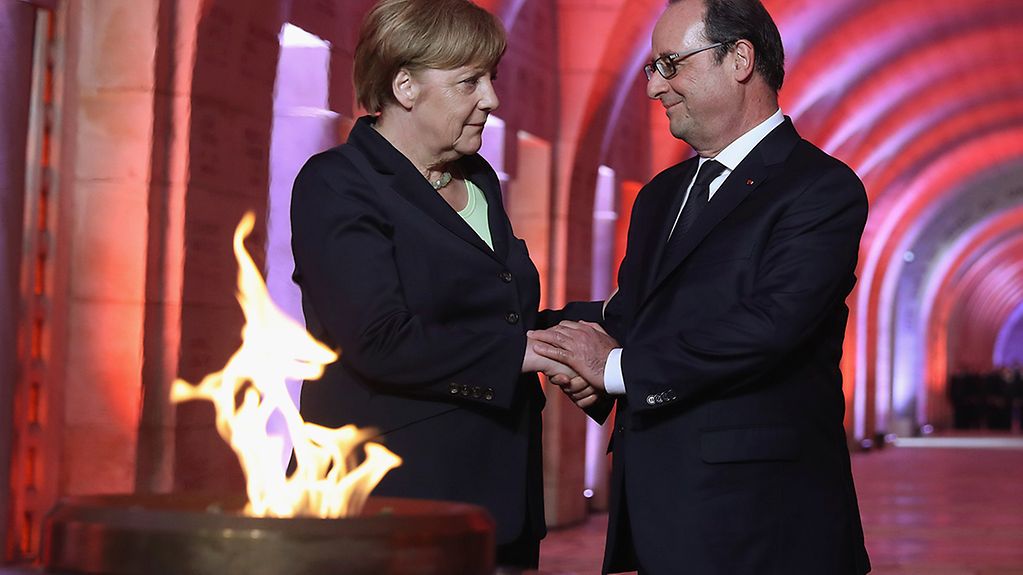100th anniversary of the Battle of Verdun
Chancellor Angela Merkel has called for us to learn from the past "in order to build a good future". It is essential to remain vigilant and "nip dangerous trends in the bud", said the Chancellor at the memorial ceremony in Verdun.

Angela Merkel and François Hollande lit the "eternal flame" in memory of the victims of war
Photo: Sean Gallup/Getty Images
Angela Merkel and François Hollande together lit an "eternal flame" in memory of the victims of the war.
During the central memorial ceremony in Verdun on Sunday, the Chancellor thanked the French President for the invitation to "pause and reflect together". "We in Germany are deeply moved by this gesture," she said.
In her address Angela Merkel stressed, "We cannot forget Verdun. Und we must not forget Verdun." Verdun is synonymous with the inhumanity and the senselessness of war per se. But at the same time Verdun is a symbol of our yearning for peace, our need to overcome enmity and to achieve Franco-German reconciliation.
"We must remain vigilant and nip dangerous trends in the bud"
The Chancellor said that the dead of Verdun were victims of narrow-mindedness, nationalism, blindness and political failure. Today it is still essential "to remain vigilant and nip dangerous trends in the bud". She pointed out how important, indeed how "vital to our survival" it is, not to build wall between nations, but to remain open to one another. "We can only learn from one another and benefit from one another if we remain open to one another and engage with one another. That is what makes for a successful Europe." At present there are "weaknesses" in the European community, she said. Europe must once again demonstrate its ability to "find a compromise, to achieve unity," declared Angela Merkel.
In terms of Franco-German reconciliation, the Chancellor underscored the importance of the Elysée Treaty which was signed in 1963 by Chancellor Konrad Adenauer and French President Charles de Gaulle. This Treaty forged a link of trust, and as such it would be almost impossible to find a more valuable legacy, she said. She also mentioned the mark made by Chancellor Helmut Kohl and President François Mitterrand in 1984, as they stood hand in hand in front of the graves of Verdun, seventy years after the outbreak of he First World War. "This gestures says more than words. It was and is an expression of a deeply felt common bond. And so today we are here to remember the many victims of Verdun together."
With a view to France the Chancellor stressed, "No trenches separate us today." And with reference to Europe she said, "It is our luck that we are unified. Let us hope that it stays that way."
Angela Merkel and François Hollande were welcomed with military honours in front of the National Necropolis of Douaumont. German film director Volker Schlöndorff was responsible for the artistic planning of the ceremony. 3,000 young people from Germany and France re-enacted the battle. At the end of the ceremony, Angela Merkel and François Hollande together lit an "eternal flame" in the Ossuary of Douaumont, home to the remains of around 130,000 unidentified French and German soldiers. The Chancellor and the President also unveiled a commemorative plaque and visited the permanent exhibition in the refurbished memorial. For the first time ever the names of both French and German soldiers who lost their lives are carved in the ceiling of the entrance hall.
At the Mémorial de Verdun Angela Merkel and François Hollande met Martin Schulz, President of the European Parliament, Jean-Claude Juncker, President of the European Commission and Donald Tusk, President of the European Council. Earlier the Chancellor and President François Hollande had discussed topical European and international issues over a working lunch.
"It means a lot to me that things are the way they are today"
In the morning, Angela Merkel spoke at Verdun Town Hall. "It is lovely that can I stand here looking at so many friendly faces in such a historic and symbolic place as this, and it is not self-evident," she declared. Even if many years have now passed since the dreadful events, "It means a lot to me that things are the way they are today. Because there is scarcely a family in France that was left untouched by the horrors of war," said Angela Merkel.
Even in the landscape around the town we can still see the traces of the war, she continued. The memory of what happened is omnipresent. "And that means we are all responsible for keeping these memories alive in future too," said Angela Merkel. "We can only learn from history and build a good future if we know about the past."
Visit to the German military cemetery
The Chancellor and President François Hollande began the day of commemoration with a visit together to the Germany military cemetery at Consenvoye where they laid a wreath. They laid another wreath at the monument to the dead children of the town. On the "Pont Chaussée" over the River Maas, 100 schoolchildren released 100 white balloons for peace.
The Battle of Verdun in north-eastern France began on 21 February 1916 and raged until December of that year. The fighting shaped the course of the First World War and cost more than 300,000 German and French soldiers their lives. In Verdun battle was waged on a hitherto unprecedented scale – modern techniques like airstrikes and poison gas were used, without either side gaining any significant advantage. The incredible losses sustained in the battle to take the purportedly impregnable fortress of Verdun are still considered to be a symbol of the brutality and senselessness of the First World War.













